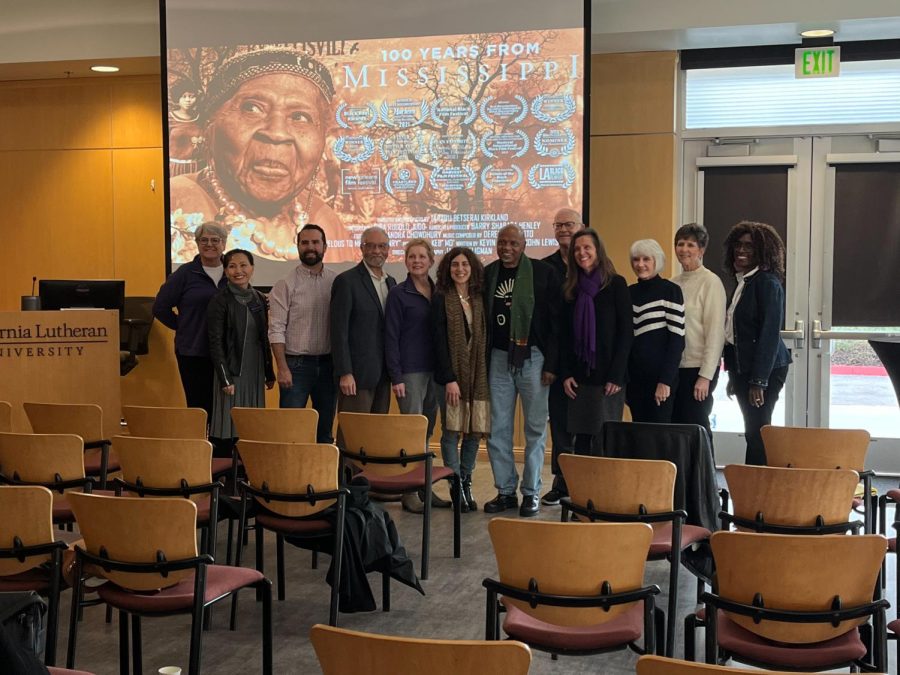‘100 Years from Mississippi’ showcases an ‘act of resistance’
California Lutheran University welcomed filmmaker Tarabu Betserai Kirkland for a screening of “100 Years from Mississippi”, a documentary that tells the life story of his mother, Mami Lang Kirkland, who’s life covers 111 years.
March 21, 2023
California Lutheran University’s Office of Talent, Culture and Diversity held a screening of “100 Years from Mississippi,” which focuses on the story of Mamie Lang Kirkland, a 111-year-old African American woman who fled Ellisville, Mississippi in 1915 to escape the forming lynch mobs that came for her father.
Director and producer Tarabu Betserai Kirkland, the youngest of Mamie Lang Kirkland’s nine children, began pursuing the idea of a film in 2015 after finding an article about John Hartfield, as well as the Equal Justice Initiative being interested in Mamie Lang Kirkland’s stories. Hartfield, a man his mother knew, was murdered in 1919 during the mass lynchings of the Red Summer.
The documentary shown on March 16 follows Mamie Lang Kirkland’s many stories of her life surviving racial terrorism and events such as The Great Depression. Eventually, Tarabu Betserai Kirkland convinces Mamie Lang Kirkland to go back to Ellisville, where she had not returned since fleeing in 1915. Though Mamie Lang Kirkland said in the film that she had no fear of Mississippi, she showed resistance to returning.
Tarabu Betserai Kirkland said his mother told him, “I don’t even wanna see Mississippi on a map.”
Tarabu Betserai Kirkland said that part of him feared that the trip would be too much since Mamie Lang Kirkland was 107 at that time, but said that when she accepted his repeated requests to return to Mississippi and arrived, he saw a weight lift from his mother.
“We just saw this thing blooming,” Tarabu Betserai Kirkland said. “And this energy just dropped from her cause it was like a release of this trauma that she had been carrying for literally a hundred years. The act of going back there was an act of resistance basically. It was ‘I’m going to confront this. I’m not going to be afraid of this anymore.’”
When they finally returned to Ellisville, to the spot where Hartfield was lynched, Tarabu Betserai Kirkland and Mamie Lang Kirkland, along with others, shared a moment of silence for Hartfield and prayed. In an act of memorialization, they took some of the soil off the grounds and put it in a jar that is now in an exhibit at The National Memorial for Peace and Justice in Montgomery, Alabama.
“One of the things people have said that impress them the most is how, despite all this terror and this violence, auntie Mamie maintained her sense of forgiveness and her compassion and her love,” Tarabu Betserai Kirkland said.
Tarabu Betserai Kirkland said that he himself may have not been so “magnanimous” if he were in her situation and that Mamie Lang Kirkland was almost “transcendent” in her state of mind.
Director of Payer Strategies and Values Based Contract Management Ann Boynton said that Mamie Lang Kirkland’s forgiving nature struck her and gave her hope.
“Seeing what she went through and her incredible spirit is both terrifying and reassuring and uplifting at the same time,” Boynton said.
Melissa Maxwell-Doherty, vice president for Mission and Identity, said that the movie reminded her of a quote from Archbishop Desmond Tutu.
“‘Goodness is stronger than evil, love is stronger than hate’ and you think of all the things she witnessed in her life. The terror of that, the trauma of that, and how she’s moving forward in love and hope…it’s really a tribute to the human nature,” Maxwell-Doherty said.
Boynton said that the message she got from the film was one of hope and forgiveness.
“There’s a point in the film where she’s asked, ‘do you hate white people?’ And she says ‘no, but I’m afraid of them,’” Boynton said. “We can all aspire to having that level of grace within ourselves.”
Beyond his desire to share his mother’s many stories, Tarabu Betserai Kirkland said he wanted to educate people about the horrors of what African Americans faced in the United States from slavery onward. He said that his first response to his mother’s story of fleeing Mississippi and Hartfield’s lynching was a question: How could anybody do something like that to another person?
“In reality, you cannot respond to another human being like that unless you believe that they’re less than human,” Tarabu Betserai Kirkland said. “But the story was also an inspiration and an inspiration for the film, obviously because it taught ‘be early on that, there’s a legacy that exists out there that’s really pretty ugly, but it’s not gonna get any better by ignoring it. It’s something you have to learn from and learn how to confront and respond to.’”
Tarabu Betserai Kirkland said that the biggest challenge that we face as a country is the inability to confront that legacy, specifically in the education system.
“I think the idea that if we teach children a truer history of America, that they’ll grow up not loving their country is ridiculous in my opinion. I think the opposite is true,” Tarabu Betserai Kirkland said. “If we teach children the true history of our country they will grow up understanding the past and have a desire to want to change it. To address it. Not to hide it, not to run away from it. If patriotism has to be based on propaganda it’s not really patriotism, it’s a denial of truth.”




















